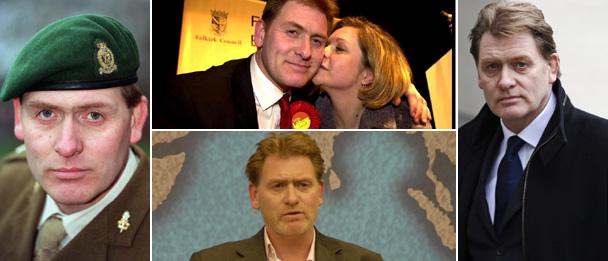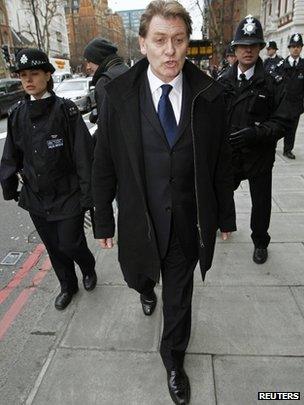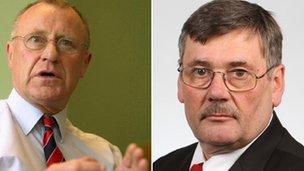The life and times of Eric Joyce - from Army major to disgraced MP
- Published

Eric Joyce - a former Army major and a member of parliament for Falkirk for the last 13 years
Eric Joyce started out in his political career as a self-styled, idealistic campaigner.
But 13 years on from his election as a Labour MP he has found himself pleading guilty in an Edinburgh court to breach of the peace and facing a £1,500 fine.
The 53-year-old - who avoided jail but received a fine and a three-month pub ban in 2012 following a brawl at Westminster - was once a respected Army major and a Ministry of Defence aide.
In recent years, he has been better known for fighting with the Labour Party, and earning the unenviable tag of "Britain's most expensive MP".
Joyce was fined £1,500 at Edinburgh Sheriff Court after admitting abusive behaviour at the city's airport.
He was also ordered to pay compensation of £100 to the airport worker he abused in an incident on 19 May last year.
Two years ago he spoke outside a London court of his "personal shame" for assaulting four fellow politicians in a House of Commons bar, for which he was fined £3,000 and ordered to pay £1,400 in compensation to his victims.
Four years ago he was convicted of drink-driving and following the February 2012 bar brawl, allegations of an inappropriate friendship with a teenage girl were splashed in a tabloid newspaper.
It all started out out so differently for the former Army major, who spent 21 years in the forces, latterly with the Royal Army Education Corps.
He went on to serve as an aide to four ministers, including two defence secretaries.
Joyce first came to public attention in 1998, when he branded the Army "snobbish and rife with racism and sexism", while still a serving soldier.
Writing a series of articles, including an unauthorised pamphlet for the left-wing Fabian Society, Joyce said he had a duty to speak out, insisting he only did so to change the forces for the better.
He later began making regular media appearances and launched a magazine, the Armed Services Forum, which contained severe criticism of the forces.
His comments were too much for the Army, which branded him unemployable.
Joyce, who by the end of 1998 was suspended but still on the Army payroll, made it onto the shortlist of Labour candidates for the first Scottish Parliament elections in 1999 - sparking Tory claims that he was being protected by the government.
But it was Westminster, rather than Holyrood, where Joyce would begin his career as an elected member.

Eric Joyce on his way to the magistrates' court in London
The Falkirk by-election in 2000 was a headache for Labour in itself, given it was triggered by the resignation of popular MP Dennis Canavan, who had quit the party in protest to stand as an independent for the Scottish Parliament, after being excluded from Labour's candidate list.
Joyce won the seat - just - after a swing of more than 16% from Labour to the SNP, giving him a 705-vote majority.
He then got down to business, giving his backing to the UK government's military strategy in Afghanistan.
So far, so good for Joyce - until he began raising eyebrows over his travel claims.
Back in 2006, the full scale of the MP expenses scandal was years away from exploding, but Joyce went straight to the top of the list, after claiming a total of £174,811.
He put the bill largely down to travelling between London and his constituency, and pledged to halve his costs.
Despite his promise, Joyce again put in the highest level of allowances, claiming more than £187,000 in 2007-08.
Again, he said he would reduce claims by taking the train, rather than flying, as well as publishing a regular travel diary.
Closer to voters
He also became one of several MPs who voted in favour of keeping the additional costs allowance for second homes, worth up to £24,000 a year. He was later told to repay some of his expenses claims.
In 2009, Joyce also defended a decision to open two offices less than six miles apart in his constituency, saying his beefed-up operation would bring him closer to the voters.
Meanwhile, the MP was working away as an aide to the then defence secretary, Bob Ainsworth.
At a time when ministers were under intense criticism over their bid to reduce payouts for wounded soldiers, Joyce criticised the government's decision to appeal against compensation awards for two wounded soldiers, calling the move "bonkers".
He said the cases, if successful, would have been a victory for "bureaucracy over bravery".
Despite his previous support for the Afghan campaign, Joyce had become concerned and quit his defence role in September 2009, saying the UK could no longer justify growing casualties by saying the war would prevent terrorism back home.
Then, during a fringe meeting at the 2010 Labour conference, tensions between Joyce and his former boss boiled over in a very public way.
Launching a salvo, Mr Ainsworth accused Joyce of failing to come up with a single idea when he worked for him at the MoD, while Joyce, in a counter-strike, said Mr Ainsworth was "to the right of the Tories".
Before the last election, Joyce had added his name to the list of Labour MPs concerned about the direction of the party and afterwards, saying the party had become "sluggish" and had "no appetite at all for new thinking".
He had also questioned the government's commitment to renewing Trident nuclear weapons.
Labour whip
But in opposition, it seemed Joyce was on the comeback trail after being handed the role of shadow Northern Ireland minister under the new leadership.
However, he was forced to quit the role, after he was banned from driving after failing to provide a breath test in his constituency.

Eric Joyce took over [from left] Dennis Canavan's old seat and was parliamentary aide to Bob Ainsworth
Pictures of Joyce emerging from a local police station in a dishevelled state after a night in the police cells did not help.
The scene at the Commons' Strangers' Bar in February 2012 was described as like something from the Wild West, as Joyce got stuck in to several of its patrons, after declaring there were "too many" Tories present.
Also on his list of victims was Labour whip Phil Wilson and two Tory councillors as Joyce, who had been drinking wine, shouted at police trying to restrain him: "You can't touch me, I'm an MP."
News of Joyce's drunken assault, coupled with the newspaper allegations, which were denied by Joyce, were enough for Scottish Labour leader Johann Lamont, who said he had become unworthy of representing the party.
A year later he was arrested again following an alleged brawl in a different Commons bar, which led to a ban on him buying alcohol in the Houses of Parliament.
He lost the Labour whip at Westminster after his 2012 arrest and, once again deemed unfit for service by his employer, Joyce announced his intention to quit as an MP, but not until the next election in 2015.
With no requirement for Joyce to stand down from parliament, given the community sentence handed down for the attack, he pledged to carry on as an independent MP after expressing remorse for his actions.
But this latest incident has left him reflecting on whether to continue as an MP until the next general election in May 2015.
- Published21 March 2014
- Published12 March 2012
- Published2 March 2012
- Published2 March 2012
- Published24 February 2012